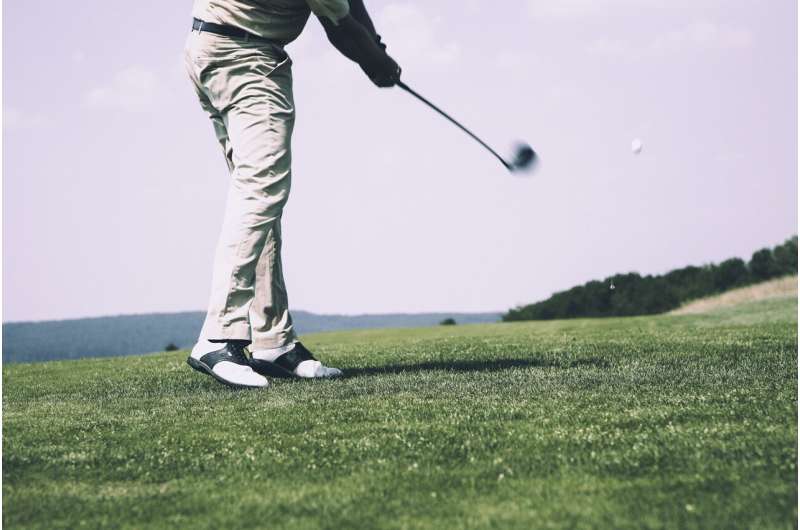
Image credit: Pixabay/CC0 Public Domain
Checking your work emails or taking work calls while playing golf may prevent you from hitting that elusive eagle or birdie, according to a group of researchers from the Department of Information Science at Stellenbosch University (SU).
They surveyed 186 recreational golfers at five different clubs about their performance, enjoyment of the round and their smartphone use during play. The data was collected directly after the golfers’ midweek club competitions. Participants were asked to report how frequently they used their phones during the round for work-related calls, emails, WhatsApp messages, personal calls and social media.
The results of their study were published in International Journal of Performance Analysis in Sport.
“We found that golfers’ performance was not affected when they used their phones for personal purposes, such as checking social media feeds or responding to messages. However, when they read work-related emails or took work calls, their performance dropped,” says lead researcher Dr. Daniël le Roux from the Cognition and Technology Research Group in the Department of Information Science at SU.
He conducted the study with postgraduate students Lise Carstens, Cole Walburgh and Christen Werth.
“Interestingly, our data showed no direct impact of smartphone use on golfers’ enjoyment of the round. However, as any golfer can attest, performance is the key to enjoying the round.
“Our study highlights the double-edged nature of smartphones on the golf course. While they offer the convenience of staying connected, their interference can impair concentration and performance and ultimately make the game less enjoyable,” adds Le Roux.
“We should not underestimate the power of digital distraction, which are situations in which a person shifts their attention from an ongoing primary activity (e.g. a conversation, work, driving, or a round of golf) to a secondary activity that involves using a computing device such as a smartphone or tablet,” he explains.
“For example, during a round of golf, using a smartphone to measure distance would be considered a task-related activity and therefore not a case of digital distraction. However, reading a work-related email or answering a work call between shots would be a digital distraction because it is qualitatively unrelated to the task of playing golf.”
Although sustained attention is known to be important for golf performance, according to Le Roux, apart from a few studies on elite golfers, there are very few studies on how recreational golfers manage their attention between shots.
He points to a 2015 survey that Golf Digest conducted among 233,000 golfers to test their attitudes toward smartphone use on the golf course.
The majority of respondents (44%) said they check or use their smartphone every few holes during a round. 21% said they are “inextricably linked to their phone” and can’t play a round without checking it. While 19% of respondents said they carry their smartphone in their pocket, 66% said they try to forget it during play.
“Interestingly, however, no one seems to have investigated how smartphone use during play affects golfers’ performance and enjoyment of their rounds,” says Le Roux.
“Using a smartphone during play can disrupt a player’s concentration and consequently affect their performance. This in turn can reduce the enjoyment of the round.”
Why are some forms of smartphone use more harmful than others?
The answer, according to Le Roux, may lie in attentional residue. “Attentional residue describes how the content of an email or conversation stays in our minds after we put our phones away. It’s likely that these lingering thoughts make it difficult for golfers to focus clearly during swing routines. Work-related communication appears to generate more attentional residue than other forms of smartphone use.”
Le Roux says recreational golfers who want to improve their concentration should be aware that using their smartphone can negatively impact their performance during play.
“They should identify which smartphone activities disrupt their concentration during recording and create high attentional residues. With this knowledge, they can develop strategies to help them avoid these distractions by blocking certain notifications or putting their phones on silent.”
However, he and his co-researcher are hesitant to suggest that recreational golfers can improve their performance by not using their phones while playing.
More information:
DB le Roux et al, The effects of smartphone use during play on performance and enjoyment in recreational golfers, International Journal of Performance Analysis in Sport (2024). DOI: 10.1080/24748668.2024.2348285
Provided by Stellenbosch University
Quote: Study shows: Work emails and calls on the golf course worsen performance (August 7, 2024), accessed August 7, 2024 from https://phys.org/news/2024-08-emails-golf-worsen.html
This document is subject to copyright. Except for the purposes of private study or research, no part of it may be reproduced without written permission. The contents are for information purposes only.




